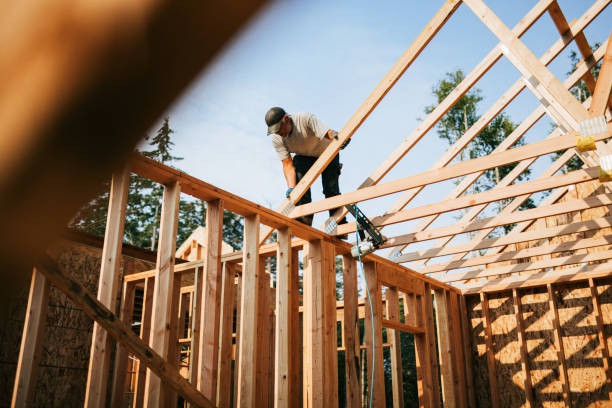Embarking on the journey of building your own home is both exhilarating and daunting. Having a well-thought-out plan can make all the difference. You’re not just constructing walls and ceilings; you’re crafting the place where memories will take shape. Just like any adventure, this one requires attention, dedication, and a touch of creativity.
1. Setting Clear Goals and Expectations
Before laying the first brick, have a sit-down with yourself or your partner to discuss what you envision for your home. Are you thinking about a modern minimalist space, or are you inclined towards a classic cottage feel? Having a clear vision will not only guide the design but also help in minimizing backtracks and revisions along the way.
Considerations for Design
-
Style preferences (modern, rustic, traditional)
-
Energy efficiency and sustainability
-
Budget constraints
2. Choosing the Right Team
Your dream home deserves the best hands to build it. Selecting the right team of professionals is crucial. You’ll need a reliable group that includes architects, contractors, and builders who understand your needs and can deliver quality results.
How to Pick Your Contractor
Ask for recommendations and read online reviews. Sit for interviews with potential contractors and discuss their previous work. Don’t hesitate to ask for references from past clients.
Questions to Ask Potential Contractors
-
What’s your experience with projects like mine?
-
Are you licensed and insured?
-
Can you provide a detailed quote?
3. Designing Your Dream Home
The design phase is where your dreams start taking shape. Collaborate closely with your architect to ensure your ideas are well-represented on paper. Taking this step seriously will minimize future alterations that could be costly or time-consuming.
A venture into custom home design in Chester means you can merge unique architectural elements with personal touches. This ensures your home reflects your style while complementing the surroundings.
4. Effective Communication is Key
Communication keeps your project running smoothly. Regular updates and meetings with your team are necessary. Be open about changes or concerns to prevent misunderstandings.
Holding Regular Meetings
Frequent check-ins allow your team to inform you of progress and potential issues. It’s a great opportunity to address concerns before they evolve into problems.
5. Monitoring Construction Progress
Keep a close eye on the development of your home. This ensures that timelines are respected and that quality is maintained. Visiting the site regularly will give you peace of mind and allow you to witness your dream materializing.
Tips for Site Visits
-
Schedule visits at different times of the day
-
Bring a checklist of details to inspect
-
Take notes and photos for your records
Home builders in Kentville, NS, offer invaluable local expertise. They are aware of local regulations and environmental factors, allowing for a smoother construction process.
6. Quality Control
Quality is a non-negotiable aspect of home building. Ensure your team understands your standards and inspects their work regularly. Never hesitate to question anything that seems out of the ordinary.
Checking Material Quality
Ensure that the materials used meet industry standards. Discuss with your contractor about sourcing the best options for your budget.
Essential Materials to Evaluate
-
Foundations and concrete quality
-
Lumber and structural materials
-
Insulation and roofing
7. Financial Planning and Budgeting
Having a solid financial plan is crucial. Unexpected expenses can arise, so having a cushion for these costs is wise. Make sure you’re regularly updated on how the budget is being utilized.
Creating a Budget Plan
Work with your contractor to itemize costs and set aside funds for unplanned expenses. This will prevent your project from being stalled by financial shortfalls.
8. Securing Permits and Meeting Regulations
Navigating the legalities in home construction can be complex. Ensure you’re aware of the necessary permits and comply with building codes. It’s crucial to research or consult professionals about local regulations.
What to Know About Permits
-
Different regions have varied requirements
-
Applications can take time, so plan ahead
-
Ensure all paperwork is completed accurately
9. Thinking Long-Term with Maintenance
Once your house is built, maintaining its quality is key. Developing a regular maintenance routine will help preserve its value and condition.
The Importance of Regular Checks
-
Inspect roofing and gutters
-
Monitor plumbing and electrical systems
-
Check for cracks or structural issues
Why Long-Term Planning Matters
Looking beyond the initial construction helps you plan for eventual renovations or upgrades. This foresight can save you time and money down the road.
10. Welcoming Your New Home
Finally, moving in is incredibly satisfying. After months or even years of planning, you now have a space to call your own. This isn’t just a product of professional home construction but a place built with dreams, dedication, and love.
Final Thoughts
In this thrilling chapter of your life, remember that proactive planning and effective oversight are vital elements in ensuring the best outcome for your home-building journey. Your home isn’t just bricks and mortar; it’s a personal sanctuary where every corner tells a story.


